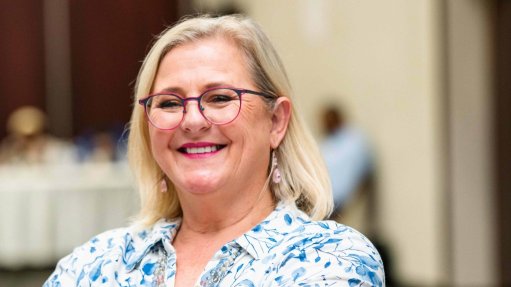Power Trading to Surge in African Renewables Renaissance
This article has been supplied.
By Theuns Ehlers - Head: Resources & Project Finance at Absa CIB
The African energy market is maturing and becoming increasingly de-centralised as renewable energy projects have surged. While much of the focus has been on infrastructure in the generation and transmission parts of the value chain, power trading companies and power aggregators are starting to emerge as important new role players.
With new business models and opportunities coming to market, the question of how power trading businesses will be funded becomes an important topic.
Historically, African energy markets have been very centralised in their structure with a State-Owned Entity (SOE) effectively responsible for generation, transmission, and distribution. This resulted in limited price discovery and consumers were ultimately forced to take the price – and associated increases – from a single supplier.
With generation capacity now being extended to private power producers, this creates a structural shift in the market. Instead of a single power producer, we now have multiple Independent Power Producers (IPP’s) selling power to utilities, and also directly to corporate customers. Most utility scale projects still require the power grid to wheel power to customers; however many power consumers also try to maximise on-site or ‘behind the meter’ generation. In the African context where many power consumers experience load shedding or load curtailment, behind the meter systems contribute to power security in instances where grid power is unreliable, in much the same way as thousands of households are already using a combination of rooftop solar and battery storage to become largely independent from the grid.
This structural shift in the marketplace has created a high degree of investor interest and several organisations have been issued with licenses to operate as power traders.
As one of the leading funders of renewable energy projects on the African continent, we are excited to see these new entrants and to unlock funding for these new models. Funding IPP’s supplying power to power traders and aggregators requires a different approach to assessing the risk associated with these projects.
For the more traditional bilateral C&I project which features a single seller (IPP) and single buyer, typically with a very long-term PPA between them, the credit assessment is mainly focused on the credit quality of the buyer and the commercial terms of the PPA between them. Power traders typically have much shorter-term contracts with their clients, more flexible terms and typically also a diverse portfolio of clients who they will supply. IPP’s however still require debt funders to take a longer-term view on the financing, to ensure they can offer a commercially competitive tariff. Banks are therefore increasingly starting to take a view on the broader electricity market where these projects are developed. For the trader model, where the client base is diversified, the power buyer credit assessment is enhanced by a more diverse portfolio.
Ultimately both debt and equity investors have to be satisfied that there will be a market to sell their ‘product’ (power), at a rate (tariff) that will meet debt demands and a reasonable return for shareholders. The focus is therefore also on the overall cost to produce power and what the minimum (breakeven) tariff will be to keep the project whole. In most African markets where we experience significant power supply issues, we don’t expect any challenges to sell power in the short term, however, banks and investors also have to consider the longer-term outlook, where the cost of production will be a key consideration. In this regard, renewable energy currently offers significant savings when compared to fossil fuel alternatives (and grid power).
Investors taking a very long-term view on the market, have to plan for a scenario where it may be possible at some future point that the market may be oversupplied during certain times of the day. We are already seeing load curtailment for PV in some European markets during certain hours of the day (due to oversupply). One way to solve this and keep a plant relevant may be through adding energy storage to the plant, allowing the facility to dispatch power during peak demand times and potentially also earn higher tariffs during periods of higher demand. The cost of battery storage systems therefore also becomes an important consideration for new renewable energy plants to ensure long-term sustainability of the technology.
The African continent continues to face a significant power supply deficit with more than 600 million people without access to modern energy. Lack of adequate investment in transmission and distribution networks does not help the situation. However, this does also create an opportunity for new, modern renewable energy technologies to fill part of the gap, especially in decentralized or microgrids, where it may be cheaper to deploy renewable energy compared to expensive investment in the grids. We believe that IPP’s and power traders and aggregators have an important role to play in addressing the desperate needs of corporates and households across the African continent, to provide more sustainable access to power, at affordable rates. As a Pan African bank, we are excited about these developments and will continue to look at innovative ways to play our part in bringing these opportunities to life by providing capital to projects that ultimately benefit Africa.
Article Enquiry
Email Article
Save Article
Feedback
To advertise email advertising@creamermedia.co.za or click here
Comments
Press Office
Announcements
What's On
Subscribe to improve your user experience...
Option 1 (equivalent of R125 a month):
Receive a weekly copy of Creamer Media's Engineering News & Mining Weekly magazine
(print copy for those in South Africa and e-magazine for those outside of South Africa)
Receive daily email newsletters
Access to full search results
Access archive of magazine back copies
Access to Projects in Progress
Access to ONE Research Report of your choice in PDF format
Option 2 (equivalent of R375 a month):
All benefits from Option 1
PLUS
Access to Creamer Media's Research Channel Africa for ALL Research Reports, in PDF format, on various industrial and mining sectors
including Electricity; Water; Energy Transition; Hydrogen; Roads, Rail and Ports; Coal; Gold; Platinum; Battery Metals; etc.
Already a subscriber?
Forgotten your password?
Receive weekly copy of Creamer Media's Engineering News & Mining Weekly magazine (print copy for those in South Africa and e-magazine for those outside of South Africa)
➕
Recieve daily email newsletters
➕
Access to full search results
➕
Access archive of magazine back copies
➕
Access to Projects in Progress
➕
Access to ONE Research Report of your choice in PDF format
RESEARCH CHANNEL AFRICA
R4500 (equivalent of R375 a month)
SUBSCRIBEAll benefits from Option 1
➕
Access to Creamer Media's Research Channel Africa for ALL Research Reports on various industrial and mining sectors, in PDF format, including on:
Electricity
➕
Water
➕
Energy Transition
➕
Hydrogen
➕
Roads, Rail and Ports
➕
Coal
➕
Gold
➕
Platinum
➕
Battery Metals
➕
etc.
Receive all benefits from Option 1 or Option 2 delivered to numerous people at your company
➕
Multiple User names and Passwords for simultaneous log-ins
➕
Intranet integration access to all in your organisation


















